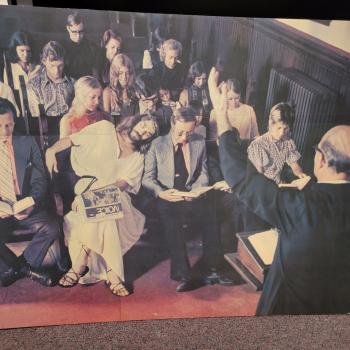BEN: In various ways, Lou Martyn seems to have anticipated a few of the themes emphasized in the New Perspective discussions, particularly in regard to ‘pistis Christou’, and in fact, I would suggest he influence Richard Hays when he was writing his dissertation on Galatians at Emory. To what do you attribute the rather huge animus directed against Lou Martyn’s ‘apocalyptic ‘ approach to Paul’s thought from various folks in the Reformed camp, in particular Tom Wright? It’s not like Martyn denies all salvation historical ideas entirely, nor does he really caricature early Judaism per se.
JOHN: Labels are difficult here. Of the key figures in the New Perspective, Tom Wright follows the subjective genitive reading of ‘pistis Christou’ but Jimmy Dunn certainly does not. I think its roots lie in Barth, mediated via the Yale school to Richard Hays and by other channels to Lou Martyn. For them both it represents a strong suspicion of talk of human faith in terms that might suggest it is a condition for salvation, a human move that elicits the divine response in salvation. I have discussed Lou Martyn’s advocacy for this in chapter 12, when we get to Gal 2.15-16, and push back there on his reading and his anxieties about agency. Tom Wright has other reasons for advocating this, not least in his sense that Jesus fulfils the role of faithfulness to God that Israel failed to fulfil (I don’t find that reading of Paul convincing, though it also derives from Barth, perhaps imbibed by Wright via George Caird). Does Tom Wright belong in the Reformed camp: in one sense yes, but I guess John Piper would contest that point, as there are certain shibboleths in the Reformed tradition that Tom has set his heart against (imputed righteousness, etc.)! Lou Martyn’s reading of Galatians (his main work) is critical of notions of salvation history (see the last post on this topic). He uses the category of ‘religion’ (as opposite to apocalyptic) in something like the Barthian sense of that term, and this is wrongly taken by some as implying a denigration of Judaism as such. Lou was extremely respectful of Jews and Judaism; in fact, I can’t think of a NT scholar of the last generation with greater sensitivity on this point (see the early essays in his ‘Theological Issues in the Letters of Paul’). But he is convinced that God has acted uniquely to create a new reality in Christ. If he had written more on Romans 9-11 we would have seen how he connected Paul’s Jewish heritage to that Christ-reality in positive ways, but I don’t think we have a lot more from him on that passage than some comments in the introduction to his Galatians commentary.
BEN: E.P. Sanders has, in my judgment rightly been accredited with wiping out the basis for the old stereotype of Judaism as nothing but a works religion, a graceless religion. The surveying of the early Jewish primary sources was very helpful, even when at points, like with 4 Ezra or Psalms of Solomon he’s not really able to demonstrate the full priority of grace in all respects. Do you think that the critique of Sanders is fair that he brings a Lutheran theology of salvation (getting in, staying in) to his analysis of Judaism, and so skews the data a bit, not least by so singularly focusing on the issue of soteriology?
JOHN: I think it is perfectly proper to ask about the soteriology of ancient Jewish texts (what else is 4 Ezra about, for instance?). My main critique of Sanders at this point is that he is confused about the meaning of grace. He thinks it means largely or primarily that God acts first in generosity (the covenant before the law, election before law-obedience); the stress he puts on sequence shows how he reads things. He then confuses this with another perfection of grace (incongruity), which as my Part Two shows is there is some 2nd Temple texts, but no means in all. What would be really Lutheran would be to talk of the incongruity of grace (God’s mercy on the unfitting) but people who don’t know Luther that well think that just saying that God gives first (the priority of grace) is Protestant/Lutheran in itself.
BEN: In your critique of Sanders, you note that he sometimes muddles together the notion of the priority of grace and the incongruity of grace, whereas the early Jewish literature does reflect the ancient concept of a gift expecting some return….. Could you unpack this critique a bit more?
JOHN: My point is this: there is debate and difference of view in early Jewish literature about the incongruity of grace (see the studies of 5 Jewish texts in Part Two). Some think God is merciful on the unrighteous and unfitting (incongruity); some think, for good reason, that God is not (that would undercut the fairness of the universe) but instead exercises mercy on those who are in one sense or another worthy or fitting recipients of grace. Sanders found the priority of grace everywhere in 2nd Temple Judaism (that God gives first), but he confused this with other perfections of grace (such as incongruity) and thus thought there was no difference between any of the Jewish texts and Paul (or the Reformation). He is right to insist that grace is everywhere in 2nd Temple Judaism; he is wrong to suggest that it is everywhere the same.
BEN: Certainly one of the more important developments in recent Pauline Studies is the so-called ‘New Perspective on Paul’ although, as you and others have pointed out, it would be better talk about ‘the new perspectives (plural) on Paul’. For my money, we really should have recognized that K. Stendahl, reacting to his own Scandanavian Lutheran heritage, was the catalyst for a good deal of this discussion, well before Ed. Sanders, or before Tom Wright used the term, or Jimmy Dunn talked about it. Stendahl (whom I took Romans with at Harvard) certainly provided a detailed critique of Luther’s exegesis of Romans 7, and the whole ‘interiority’ approach to Paul’s notions about human fallenness and redemption. But equally telling was his critique of anti-Semitic readings of Paul of various sorts. I would say this in part prompted Ed Sander’s detailed representation of early Jewish thought in a positive light. Why do you think it is that Stendahl is not given more credit for spawning various of these new developments in Pauline studies?
JOHN: I think Stendahl’s famous ‘Introspective Conscience’ essay has been very widely cited, and his essays in ‘Paul among Jews and Gentiles’ were certainly very influential when I started studying Paul in 1979. He stood in that wave of new and proper sensitivity in the 1970s that the Christian tradition had all too often supported anti-Judaism. He thus made scholars willing and eager to hear a reading of Judaism that did not result in a caricature or negative judgement. But he did not do the hard graft of a new reading of Jewish texts himself: he softened the ground for Sanders whose massive work in actually reading the texts outside the normal channels of interpretation caused scholarship to think differently.
BEN: One of the themes that arises multiple times in New Perspective discussions is the notion not only that Paul is addressing specific situations in Galatians and Romans, but that in fact his theology of grace and God’s righteousness is quite specifically tailored to his dominant audience— namely Gentiles. To me, this insight can be overplayed, because Paul is not just saying that ‘justification by grace through faith’ is how Gentiles get into the body of Christ. He is saying that that is how everyone gets in, including himself, surely. For example, in Romans 1 he stresses that the Good News about righteousness and faith in Christ is for ‘the Jew first’ and also for the Gentile. My point is that I don’t think a two track model of salvation works as an analysis of Paul’s thought, especially when Rom. 11.25ff. seems to make clear that ‘all Israel will be saved in the future’ ‘when the Redeemer comes forth from heavenly Zion and turns away the impiety of Jacob’. You don’t talk about the impiety of Jacob if you think they are already saved by some other means than Christ, and you don’t talk about Jewish branches temporarily broken off from the people of God, so they can be reintegrated into that group by grace through faith in Jesus, if you are touting a two track model of salvation. In short, it seems to me that very few of the New Perspective folks, going all the way back to Stendahl, really grasp the nettle when it comes to the radical nature of Paul’s thought when it comes to how exactly non-Christian Israel is and will be saved. Do you agree with this line of thinking, or does it have some flaws in it?
JOHN; You are right that Stendahl, in consort with Gager and Gaston in his day, and followed now by the ‘radical new perspective’ (Stowers, Zetterholm etc.) were/are very unwilling to find in Paul anything that suggested that Paul expected Jews to change in practice or belief, and one way to argue that is to say that his negative comments about the authority of the law are only as it relates to Gentiles (his only audience). A forthcoming book by Matt Thiessen will argue precisely this point as well. You will have to wait till part III (on Galatians) and part IV (on Romans) to see my take on this, but basically I agree with you that Paul does expect Jews like himself to be challenged, and reconstituted, by the gospel, even if he finds a deep connection between what God has done in Abraham etc. and what he has done in Christ. In my reading of Romans 9-11 (chapter 17) I agree with you that Paul expects ethnic Israel to be saved by faith in Christ – though this will be not an addition to, and certainly not a denial of, their Jewish Scriptural heritage, but rather its fulfilment, since God has constituted Israel all along by an incongruous grace (which I take to be the root of the olive tree in Romans 11).
BEN: Let’s talk a bit about the phrase ‘works of the Law’ which is so prominent in the discussions by the New Perspective folks. Dunn, among others wants to argue that the phrase refers to the boundary defining rituals which separate Jews from Gentiles— namely circumcision, kosher laws, and Sabbath keeping. Paul is combatting nationalistic chest thumping and hubris.
The assumption behind this assumption seems to be that Paul couldn’t possibly be suggesting that ‘all possible works of the Mosaic Law’ are passé, or no longer binding on any of God’s people. And behind that is the assumption of Reformed theology that Paul held to a ‘one covenant in various administrations’ view of covenant theology. Yet Paul quite clearly in Gal. 4, 2 Cor. 3-4, Rom. 9.1-5, and Rom. 10.1-5 in fact tells us that Christ is the end or fulfillment of that Mosaic law covenant, and that the new covenant is connected through Christ with the Abrahamic covenant, not the Mosaic one which was a ‘paidagogos’ a temporary child minder until Christ came. In short, Paul affirms multiple covenants given by God to his people, not one covenant in many administrations. In short, what is at stake is not a Lutheran reading of the Mosaic Law, but a Calvinistic and Reformed one. Why do you think this part of the discussion has become so heated, so often? Why does it seem, at least to me that Dunn and Tom Wright ‘protesteth too much’ on these sorts of issues? What is your take on all this?
JOHN: I have a discussion on ‘works of the law’ in chapter 12 (when we get to Gal 2.15-16) and think on exegetical grounds that it means just ‘the practice of the Mosaic Law’ and does not single out, or prioritise, any particular works like circumcision etc. In that respect I disagree with Dunn, who, influenced by his Reformed training (he refers to the Westminster Confession), is not inclined to allow any general critique of the Mosaic law, or any sense that its era may have come to an end. Of course how to read ‘telos’ in Romans 10.4 (as ‘end’ in the sense of cessation or ‘end’ in the sense of fulfilment) is at the exegetical heart of this whole debate, which has divided Lutherans and Calvinists from the very start. As you say, in Galatians 3 Paul makes clear that the Mosaic law had an authority for a limited time (starting 430 years after Abraham and until Christ): he does not think it is wrong as such, but it is no longer the final authority for those in Christ (even if they fulfil its core intention by walking in the Spirit). Romans brings out more this sense of the core intention of the law (‘the work of the law’, Romans 2.15; or ‘the just requirement of the law’, Romans 8.4): that indicates that believers do what the Law, at heart, was looking for. But that its final authority is broken even for Jews is clear in that, even in Romans, Paul can say that he is persuaded in the Lord Jesus that nothing is unclean in itself (Rom 14.14) and that ‘the Kingdom of God is not food and drink, but righteousness and peace and joy in the Holy Spirit’ (Rom 14.17). The Torah’s rules remain an honourable cultural tradition, which Paul wants the weak to be allowed to continue (Romans 14-15); but they also have to recognise that one can live to the Lord (God/Christ) in ignoring kosher rules, as well as in honouring them.
BEN: Don Carson and others of those who wrote in the volume entitled Variegated Nomism seem to be engaging in what I would call a rear-guard action to protect the old Calvinistic analysis of early Judaism, in particular that there were numerous advocates in early Judaism of ‘works righteousness’ which Paul is critiquing. They totally want to avoid the notion that Paul is in fact saying that the Mosaic covenant and not either legalism or works righteousness, is the real issue here. As you suggest, one of the main reasons for this whole approach is not just allegiance to a traditional Reformed analysis of Paul, but an attempt to perfect a variety of concepts conjured up by the word grace, all at once, or to mush them up together. Why do you think that people as different as Carson and Doug Campbell want to push this button?
JOHN: It is always tempting to push a concept to its logical extreme, and Christian theologians have for centuries enjoyed claiming that others have a defective understanding of grace because those others don’t perfect it in the way they think it should be. I read Carson as pushing all the Calvinist buttons (even in the language he uses), and Campbell as a natural-born radical who is influenced most by Barth but wants to push even Barthian perfections of grace to their nth degree. There is an attraction in being a ‘purist’ in these matters (others are then compromisers who don’t properly see the truth), and I guess Paul’s own polemics on this topic encourage people to think that the more they are polemical the more they are like Paul … But we sometimes apply Pauline polemics to topics he did not get hot under the collar about.
BEN: Two of the biggest contributions of your book, in my judgment are 1) demonstrating at some length the various ways ‘charis’ terminology was used in Paul’s world, and how differently it was used in a benefaction culture, than it is often used in the modern context when we talk about ‘giving with no thought of return’ and the like. What shocked me is how little the discussions of grace in Paul in the last century have even reflected a knowledge of this important contextual info for understanding Paul. And somehow the New Perspective folks, have to some degree pushed ‘grace’ to the margins of Paul’s discussion in Romans and elsewhere—- amazing! 2) I especially think your sixfold taxonomy is very helpful for sorting out which aspects of grace Paul is indeed perfecting (e.g. its priority) and which he is probably not perfecting. What happens if and when Protestant scholars especially realize they have been evaluating Paul far too much in light of their own historical theological traditions, and not enough in light of Paul’s own cultural context, both Greco-Roman and Jewish?
JOHN; The older books on grace (Moffatt) did show some knowledge of the ancient world, and Harrison’s recent book on grace in the Graeco-Roman world is a recovery and development of that tradition. But there was always the tendency to take Paul as the exception: others thought gifts required a return, but Paul believed in the unilateral or unconditional gift (in the sense of requiring no return), etc. I have tried to feed in important resources from the anthropology of gift, to expose and critique modern notions of gift, and to question how much these modern notions apply to Paul, and thus to approach Paul with a more open mind: which of the possible ways of perfecting divine grace did he employ and which did he not? As you will see from the second half of this book, I think the key perfection for Paul is incongruity (God gives in Christ without regard to worth), but this does not mean that the gift is also given with no thought of return. The disaggregation of the different perfections of gift is, for me, the key methodological work of this book, and I have had systematic theologians tell me that it would have saved an awful lot of controversy in Christian history if these distinctions had been made clear earlier …!
















